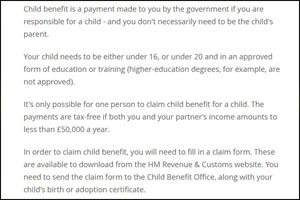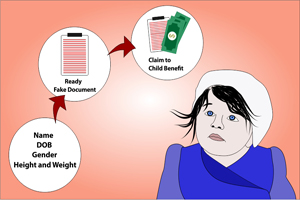Child Benefit Scams
However, some scammers go beyond their limits and harass ordinary people. Escaping from such criminal networks can be extremely challenging for the general public—unless the cybercrime department takes decisive action against these dangerous individuals operating from remote corners of the world. Scams related to child benefits have also become increasingly common and frequently make headlines. One recent case that drew attention was the scam involving Rebecca Jones, a 32-year-old woman who falsely claimed to have eleven children. She fraudulently obtained over £10,000 in tax credits from various sources and used the money to move from one house to another. Although her actions were serious, the judge showed leniency and spared her a jail sentence, instead placing her under strict supervision.

Benefit scams related to children are gaining momentum on social media platforms such as Facebook and Twitter. Scammers often send messages to the public, requesting them to provide the following personal details:
? Name of the child
? Date of birth
? Gender
? Height and weight at birth
The public is warned not to reply to these emails, as they may come from scammers operating locally or internationally from foreign locations. Although such emails are widely circulated, it is not always clear whether they are scams or harmless messages. However, people should never share personal information with third parties unless meeting them face-to-face. These messages may be related to child benefit scams, sent by individuals with malicious intent.
Never respond to these types of emails, even if you are pressured or threatened by the sender. Child benefit scams are steadily increasing, and the public must exercise caution when opening such messages or replying to them. No money should ever be transferred to third parties without conducting a thorough background check or verifying their authenticity. There are many child benefit scams, including agency fraud and overpayment fraud. In these schemes, scammers pose as agencies and send letters to the public claiming entitlement to non-existent benefits such as disability support, carer's allowance, or other fabricated payments. The public should ignore these messages, as they may originate from fraudulent sources. Scammers often plan their attacks carefully, using intelligent and persuasive strategies to deceive innocent victims. Corporate departments and individuals alike should never share their financial or personal information with strangers or unknown parties. Scammers employ a wide variety of tricks—but the public must stay vigilant and not fall into their trap.
Child benefit scams involve deceptive tactics aimed at exploiting parents or guardians who receive government assistance for their children. Scammers frequently pose as government officials, falsely offering services to help with child benefit applications. They may claim to expedite the process or provide “special” services for a fee, targeting individuals genuinely seeking help.A common technique is impersonation—scammers pretend to be from official government agencies via email, phone calls, or text messages, creating a sense of urgency to extract payments or personal details. Phishing methods, such as fake websites or emails, are used to trick parents into providing sensitive information like Social Security numbers or bank account details.
To avoid becoming a victim of child benefit scams, individuals should always verify the authenticity of any communication related to government benefits—especially if it’s unsolicited or involves a payment request. Use official government websites and visit local offices for accurate information. Be skeptical of unexpected messages and report any suspicious activity to authorities immediately. Staying informed, cautious, and vigilant is key to protecting parents and guardians from falling prey to these deceptive scams targeting child benefit programs.











